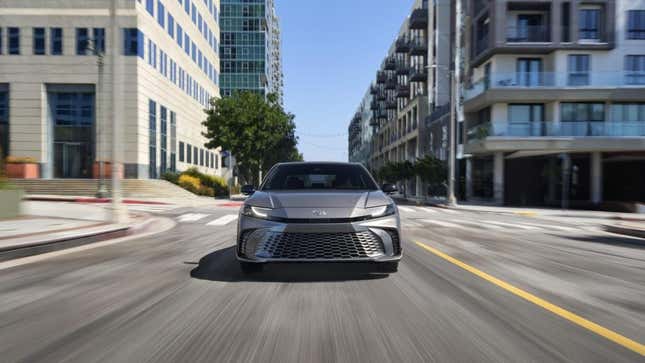
Toyota unveiled its all-hybrid seventh-generation ‘widebody’ Camry last week, internally known as XV80, which will exclusively be powered by a hybrid powertrain as its signature long-selling V6 option will no longer be available. This is arguably as important a move for the brand in the U.S. market as the introduction of the first Prius in 2001. Hybrids have come a long way in the last 22 years, and Toyota continues to define them for the mainstream market.
As many other automakers have completely shut down their sedan lineups, Toyota continues to dominate the (admittedly shrinking) market with its Camry. The somewhat bland family sedan was the fifth-best-selling vehicle in the U.S. last year, selling 295,201 examples. At that kind of volume, any significant improvement in fuel economy is going to add up fast.
I wanted to figure out exactly how much fuel would be saved by converting Camry to a hybrid-only lineup, so I did some math. Maybe this will prove to other automakers that turning normal cars into no-nonsense fuel economy misers is a great way to improve corporate average fuel economy numbers without resorting to typically expensive and slow-to-adopt electric vehicles. Maybe Toyota was right all along about the transition to EVs.
Let’s Do Some Math!
Of those 295,201 Camry sold in the U.S. in 2022, Toyota says 7 percent of them were the V6-powered XSE model (20,664 units), 11 percent of buyers opted for the hybrid (32,472 units), and the rest were the standard four-cylinder model.
Using fuel economy data from the EPA and assuming the annual driving mileage of the average American is 13,476 miles, I calculated that a Camry V6 driver would consume 518.3 gallons of gasoline per year, a four-cylinder Camry driver would burn 434.7 gallons, and a Camry Hybrid driver would get through something like 276.05 gallons in a year. There are a couple different Camry Hybrid models available, getting between 46 and 52 miles per gallon depending on spec, so I met them in the middle.
Multiply that average fuel consumption number by the number of that variety of Camry sold, and you’ll get a consumption figure for all Camrys sold in a year. All of the 2022 Camry V6s burn 10,710,151.2 gallons of gas per year, all of the Camry Hybrids burn 8,963,895.6 gallons of gas in a year, and the remaining non-hybrid and non-V6 Camrys consume a massive 105,225,655.5 gallons annually. If you have a 2022 Camry, you’re contributing to a total of 124,899,702.3 gallons burned annually.
What About The New Car?
Obviously Toyota hasn’t released all of the information about the next-gen Camry yet, and the EPA doesn’t have fuel consumption numbers available either. We can assume that the new hybrid-only Camry will be at least as fuel efficient as its predecessor, but that’s not good enough for Toyota. Between the last-gen Prius and the new Prius, the engineering team managed to make the new car nine percent more fuel efficient despite moving to a larger and more powerful drivetrain. You can pretty much bet that the new Camry will do the same.
I’m going to wager that the standard Camry Hybrid will be at least 9 percent more efficient than the current 48-MPG-average Camry Hybrid. And that doesn’t even take into account the likely availability of an AWD model with electric motors on the rear axle, or a Camry Prime plug-in hybrid model, which would pump those numbers up even higher. I’m going to conservatively estimate that the average 2025 Camry will achieve 52 MPG combined. Considering the current Camry Hybrid LE already gets 52 combined, that shouldn’t be too farfetched.
While Camry sales have been declining steadily since the early 2000s, I’m going to wager this new model will drive a bit of a sales spike in its first full year on sale, at least matching the 2022 sales number. I’m sure some of the buyers will be stepping up from a Prius, but hopefully an equal number will be coming from a larger truck or SUV, seeking improved fuel economy to balance it out.
Okay, so if the same 295,201 people purchase brand new 2025 Camry Hybrids, and get a combined average of 52 miles per gallon, they’ll consume 259.2 gallons per year individually and 76,516,099.2 gallons combined.
That adds up to a totally wild 48,383.603.1 gallons saved every year, just by Camry drivers upgrading from an old Camry to a new Camry. Toyota will dramatically increase the number of customers experiencing the joys of hybrid driving and improved fuel economy. Toyota has an opportunity here to do for hybrids what Audi and Subaru did for all-wheel drive.